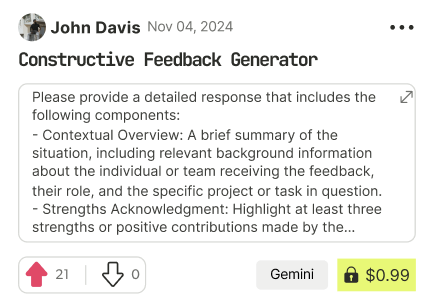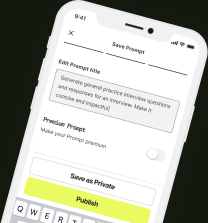prompt mine App
Find, Create & Share AI Magic
Prioritizing Tasks and Managing Time as a Student with Multiple Commitments
Suggest effective strategies for prioritizing tasks and managing time effectively for a student juggling a part-time job, extracurricular activities, and a demanding course load. These strategies will be practical, actionable, and based on proven time management techniques. The strategies will also consider realistic goals for academic success, personal well-being, and fulfillment of commitments outside of coursework.
Goal: Achieve academic success while maintaining a healthy work-life balance. This includes completing coursework on time, excelling in classes, maintaining a positive personal life, and fulfilling obligations related to extracurricular activities and a part-time job.
Strategies:
1. Time Blocking and Scheduling: Use a planner or digital calendar to allocate specific time blocks for studying, work, extracurricular activities, and personal time. This helps visualize commitments and prevents overlap. Include buffer time between activities to account for unexpected delays. For example, allocate 3 hours for studying for a challenging exam, followed by 1 hour for catching up on other work, then 2 hours for meeting with a study group.
2. Prioritization Matrix (Eisenhower Matrix): Categorize tasks by urgency and importance. Focus on high-priority, high-importance tasks first. This matrix helps identify and tackle crucial tasks while delegating or deferring less critical items. This matrix is useful for planning weekly assignments and projects.
3. Pomodoro Technique: Employ focused work sessions (e.g., 25 minutes) followed by short breaks (e.g., 5 minutes). This technique enhances concentration and prevents burnout. Use a timer or app to maintain focus and structure.
4. Task Breakdown: Break down large, complex tasks into smaller, more manageable steps. This makes tackling overwhelming projects less daunting and allows for better progress tracking. For example, a research paper can be broken down into smaller sub-tasks such as finding sources, outlining arguments, writing drafts, and proofreading.
5. Learn to Say No: Recognize and accept limitations. Prioritize commitments based on their alignment with personal goals. It's okay to decline additional activities if they compromise existing time blocks. For example, declining an invitation to a social event if it conflicts with an upcoming exam preparation.
6. Effective Study Techniques: Employ active recall, spaced repetition, and other effective study strategies to maximize learning efficiency and retention. This includes techniques like creating flashcards, practicing questions, and reviewing material at increasing intervals.
7. Optimize Work Environment: Establish a dedicated study space free from distractions. This minimizes interruptions and fosters a conducive atmosphere for focused work. For example, a quiet corner of the home or a designated study area in a library.
8. Self-Care and Wellbeing: Incorporate regular breaks, exercise, healthy eating, and sufficient sleep into the schedule. This helps maintain energy levels and mental clarity throughout the day, leading to increased productivity and reduced stress.
Sample Weekly Schedule (Illustrative):
| Time | Monday | Tuesday | Wednesday | Thursday | Friday |
|-----------------|---------------------------|---------------------------|---------------------------|---------------------------|---------------------------|
| 8:00-9:00 AM | Study (Biology) | Work (part-time) | Study (History) | Study (Math) | Extracurricular Activity |
| 9:00-10:00 AM | Work (part-time) | Study (History) | Study (Math) | Work (part-time) | Study (English) |
| 10:00-11:00 AM | Extracurricular Activity | Extracurricular Activity | Free time | Free time | Free time |
| 11:00-12:00 AM | Lunch/Break | Lunch/Break | Lunch/Break | Lunch/Break | Lunch/Break |
| 12:00-1:00 PM | Study (Chemistry) | Study (project work) | Work (part-time) | Study (Project Work) | Free Time |
| 1:00-2:00 PM | Study (Chemistry) | Free time/Personal tasks | Extracurricular Activity | Personal time /Exercise | Free time / Personal tasks|
This is a sample schedule; adjust the times and activities based on your specific commitments and needs. Be flexible and adaptable to ensure alignment with your goals.

Find Powerful AI Prompts
Discover, create, and customize prompts with different models, from ChatGPT to Gemini in seconds

Simple Yet Powerful
Start with an idea and use expert prompts to bring your vision to life!

